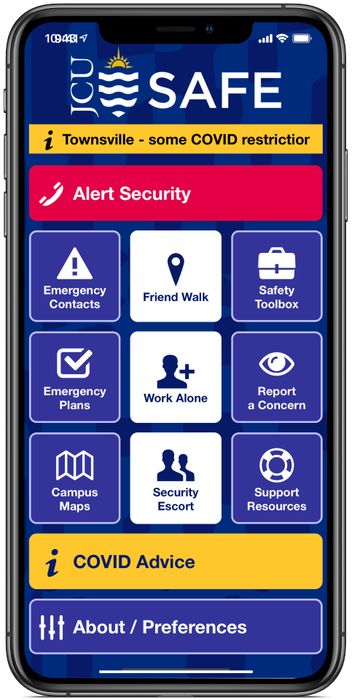Wear smart-casual clothes and closed-in shoes. You will also be presented with a Library Services name badge. A neatly presented appearance with consideration of workplace safety is appropriate in this professional work environment.




If your Team Leader does not answer, call the alternative phone numbers and ask the staff member to inform the Team Leader or one of the Library Experience Librarians of your absence.
Your team leader will email you directly to your staff email address or send you a text message. Respond to these promptly.
JCU Library uses LibStaffer, an online rostering application. Each staff member is registered in the system, check your staff emails for the welcome email from Springshare. Once you have received this you will need to Reset Your Password in order to login.
Schedules are planned a month in advance, and the following week's schedules are emailed to you on Wednesday's. You can also view your upcoming shifts online.
You can add your unavailability to LibStaffer for student classes, exams, leave etc. Enter your unavailability as Time Off in LibStaffer so that you are not scheduled at those times. You can add your time off as recurring or as a once off. If your availability changes after you have been scheduled, it is your responsibility to organise a shift swap or replacement.
Staff will, wherever it is reasonable and practical:
Casual staff are generally contracted for up to 6 months. Casual staff are expected to be available during that contract period. Discuss leave and placement requirements in advance with your Team Leader and add it to LibStaffer once approved.
Time off application will be pending in grey until accepted by the administrator (LE Team Leader) Applications may be denied if the roster has already been posted with shifts allocated and the application clashes with a rostered shift. In this case staff will be advised to 'swap a shift' or 'give up a shift'. Time off acceptances will generate an email noting the acceptance. It will then be in green on the calendar view.
Welcoming people to the library
The Library Experience Charter communicates the standard of service clients can expect from JCU Library staff. It also outlines the behaviours we expect from clients (most importantly; show respect and courtesy).
As a JCU Library Staff member, you should always;
(e.g. do not share personal details of clients with other clients)
Referrals
LibApps
Daily feedback
Privacy
JCU’s functions require the collection, creation, use and in some circumstances the disclosure of personal information about students, staff and other clients. The University is committed to protecting personal privacy and recognises that staff and students have a reasonable expectation that the University will protect and appropriately manage the personal information it holds about them (JCU, 2024).
In the Library, this means:
For more information see JCU's Information Privacy Policy
Phone messages
Communication
Furniture, equipment and facilities
You work in an amazing building with a rich history. Help us keep the building and its spaces looking clean, tidy and safe by:
Remember to always follow WH&S policies and procedures when carrying out these tasks.
Maintenance
Maintenance staff from external organisations are expected to:
Vital Statistics
Security
Emergencies only
General enquiries
Contact JCU Security Service by email to securitycontrol@jcu.edu.au
Report Security Incidents
Report all security incidents as early as possible to the Security Office or a Security Officer. Any emailed reports may be sent to security@jcu.edu.au. All reports remain confidential.
The JCUSafe App provides, in one location, information on the University's security and safety plans and resources. JCUSafe is an important tool to provide a safe environment for staff and students as well as meeting emergency response and critical incident obligations. Key features include:
Download the JCUSafe app from the Apple Store or Google Play.
We acknowledge the Australian Aboriginal and Torres Strait Islander peoples as the first inhabitants of the nation and acknowledge Traditional Owners of the lands where our staff and students, live, learn and work.

This work is licensed under a Creative Commons Attribution-ShareAlike (CC BY-SA) 4.0 International License, unless otherwise noted. Content from this Guide should be attributed to James Cook University Library. This does not apply to images, third party material (seek permission from the original owner) or any logos or insignia belonging to JCU or other bodies, which remain All Rights Reserved.